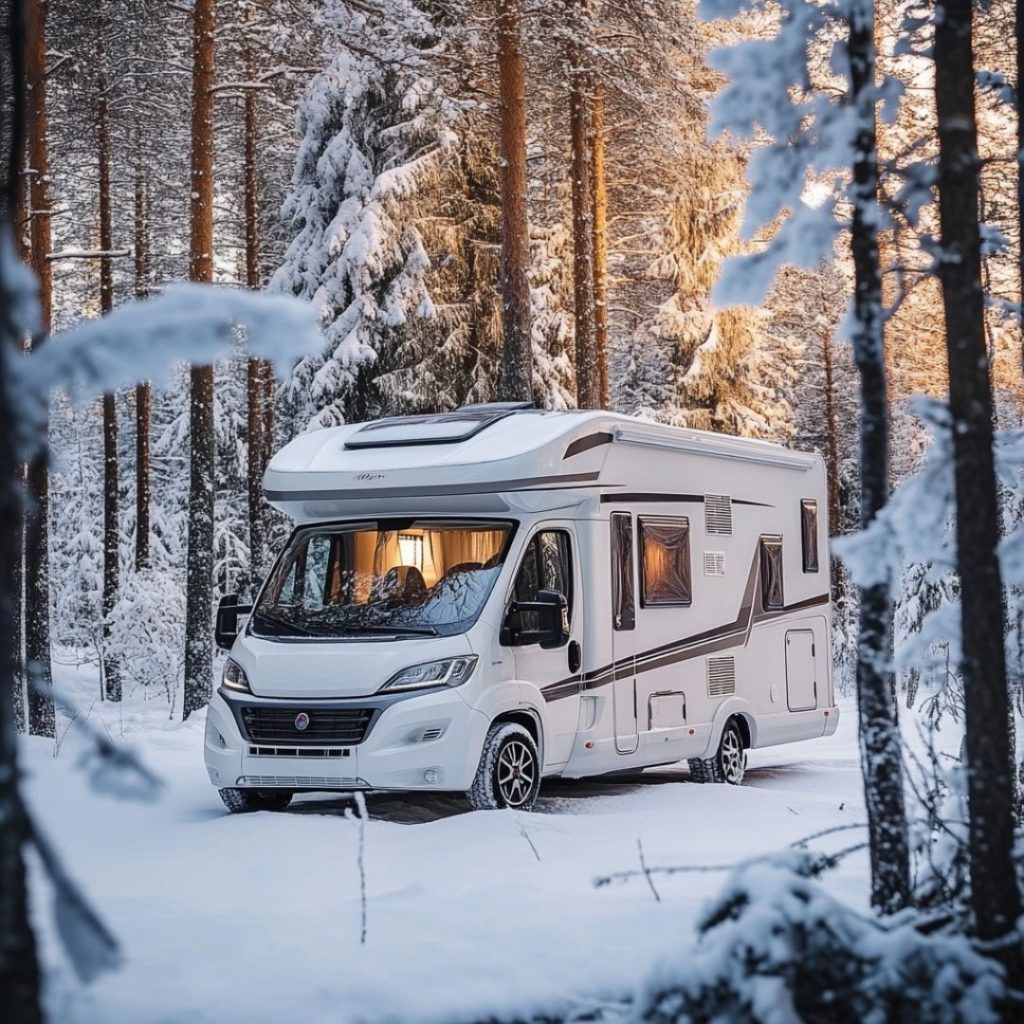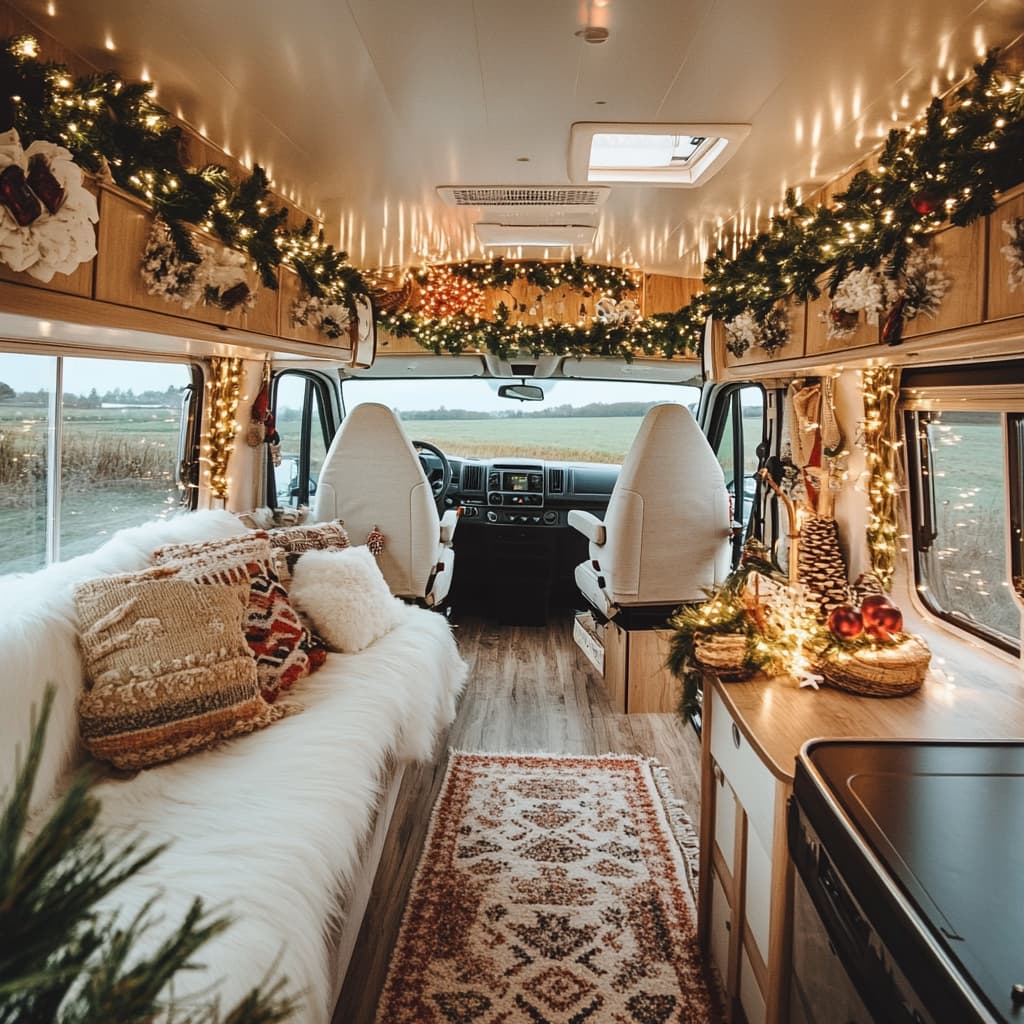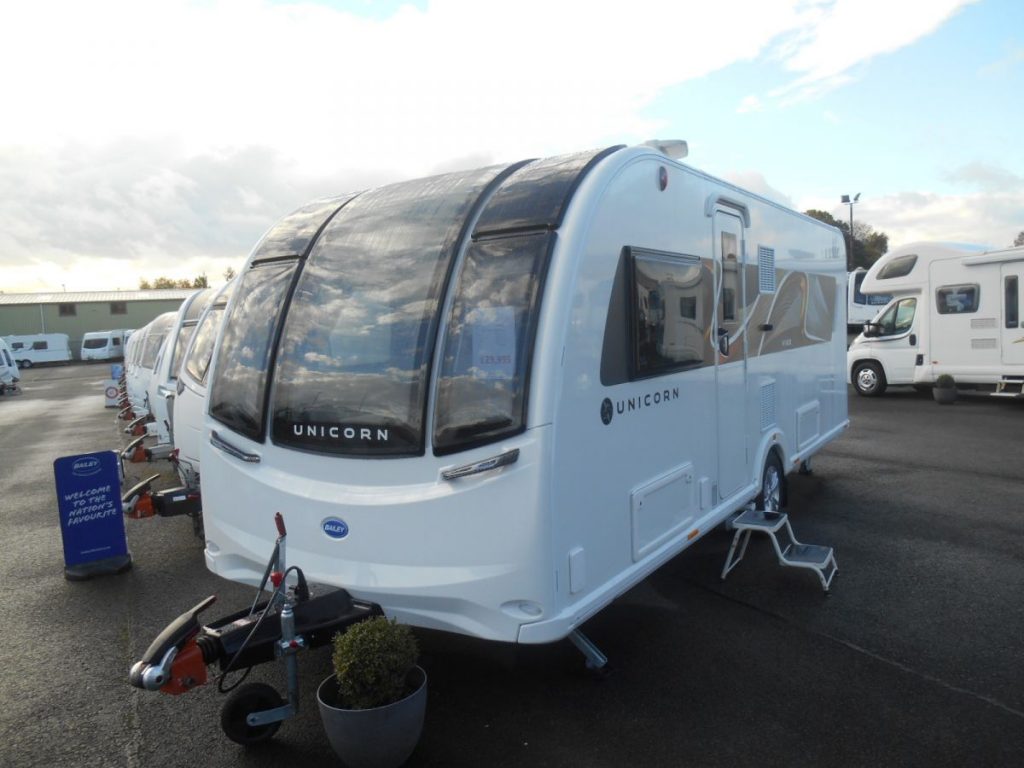How to Winter-Proof Your Motorhome and Create a Festive Wonderland
With Christmas just around the corner, now is a good time to embrace the holiday spirit on the road in your motorhome. Whether you’re heading to a cosy countryside site or planning a staycation in your driveway, your motorhome can become the ultimate festive retreat.
We’ve shared our top tips for winter-proofing your motorhome and transforming it into a Christmas wonderland.
How to Winter-Proof Your Motorhome

The colder weather comes with its challenges. Giving your vehicle some extra care over the colder months helps ensure you’ll be ready to hit the road again when the first signs of spring appear.
Here’s how to ensure your motorhome is warm, safe, and comfortable this season:
1. Give It a Thorough Clean
Start by giving your motorhome a good wash, both inside and out. Remove any dirt, grime, or tree sap that’s built up during the autumn months. Keeping your paintwork and windows clean helps prevent corrosion and makes it easier to spot any wear or damage that may need attention. On the inside, vacuum floors and upholstery, wipe down surfaces, and ensure that all cupboards and drawers are free of crumbs. A tidy interior is less inviting to any small pests seeking winter shelter.
2. Keep Moisture at Bay
Damp can be a real nuisance during the winter. Consider investing in a couple of dehumidifiers around the living area. Regularly airing your motorhome on dry, crisp days can also help keep the interior fresh. Check around windows, doors, and vents for any signs of leaks. If you find a suspicious patch of damp, address it promptly by resealing or patching up the affected area before the problem gets worse.
3. Protect Your Water System
Frozen pipes can lead to nasty surprises when temperatures drop. Drain your water system before the cold sets in, including taps, tanks, and the boiler. Running a bit of antifreeze through the system (following the manufacturer’s guidelines) can also offer peace of mind. Keeping all water sources bone-dry will significantly reduce the risk of unpleasant winter damage.
4. Look After Your Batteries and Electrics
Your motorhome’s battery is more likely to suffer from low temperatures. If possible, remove it and store it somewhere cool and dry, keeping it charged and ready for use. If you need to keep the battery connected, consider a solar charger or a trickle charger to maintain its power levels. Give the electrical connections a good once-over, making sure everything is securely attached and free from corrosion.
5. Maintain Tyres and Brakes
Make sure the tyres are properly inflated and that there’s enough tread to safely handle slippery road surfaces if you do take it out. Check the brakes and ensure all moving parts are in good working order. Taking the time now to ensure they’re in tip-top condition will save you hassle when you’re ready to head off on your next journey.
6. Consider a Protective Cover
If you’re storing your motorhome outdoors, investing in a breathable cover can work wonders. A cover will help shield it from rain, snow, and any stray debris carried by the winter winds. Make sure the cover fits correctly and doesn’t trap moisture underneath. You could also think about a wheel cover to protect tyres from UV damage if your parking spot gets a bit of low winter sun.
7. Keep Up the Regular Checks
Just because it’s not out on the open road doesn’t mean your motorhome can be forgotten. Even if it’s resting on your driveway or in secure storage, pop in every now and again to check for any signs of problems. Giving it a quick airing, ensuring the battery still has life, and inspecting the interior for damp or pests can prevent small issues turning into larger headaches come spring.
In a Nutshell
A bit of thoughtful care during the winter months will help preserve your motorhome’s condition and make sure it’s ready to go as soon as the warmer weather sets in. By cleaning, protecting against damp, tending to the water system, maintaining the battery, and using proper covers, you’re setting yourself up for trouble-free touring next season. Winter might be resting time for your motorhome, but with a little extra attention, you’ll be rolling confidently into the new year, whatever the weather brings.
How to Create a Festive Motorhome

Once your motorhome is winter-ready, it’s time to add some holiday cheer!
The holidays are a great time to travel in your motorhome and transform it into a cosy, festive retreat. The following tips will help you decorate your motorhome for the holidays whether you’re going on a seasonal getaway or staying at home but still wanting to transform your motorhome.
1. Christmas Decorations
Motorhomes are perfect for creating a cosy, festive atmosphere with thoughtfully chosen decorations. Miniature Christmas trees, battery-powered fairy lights, and adhesive hooks for hanging stockings or garlands add a magical touch while keeping everything beautifully organised.
2. Soft Blankets & Cushions
Swap out your regular cushions and blankets for festive alternatives in rich reds, greens, and golds. Look for throws with wintery patterns, like snowflakes or tartan, to add warmth and comfort to your space.
3. Add Window Decorations
Window clings featuring snowflakes, stars, or holiday greetings are a brilliant way to add charm to your motorhome without taking up any physical space. Pair these with LED window lights or festive curtain ties for an extra touch of cheer.
4. Create a Festive Dining Space
Invest in a few seasonal tableware items, such as themed plates, mugs, or placemats. A small vase with holly sprigs or a festive table runner can instantly elevate your dining area.
5. Holiday Treats and Drinks
Stock your motorhome with seasonal favourites like mince pies, hot chocolate, and mulled cider. A small slow cooker is perfect for warming drinks or preparing hearty winter meals.
6. Scent the Space
Nothing evokes Christmas quite like the smell of cinnamon, pine, or mulled wine. Use scented candles, wax melts, or essential oil diffusers to fill your motorhome with these comforting aromas. Be mindful of ventilation and safety when using candles.
7. Customise the Exterior
You can spread holiday cheer by decorating the exterior of your motorhome. You can add a small string of outdoor fairy lights, a wreath, or magnetic signs to make your vehicle stand out.
8. Keep it Practical
Remember to maintain functionality. Ensure decorations are secured properly to avoid movement during travel, and avoid blocking essential controls or vents.
With a little creativity, you can transform your motorhome into a lovely festive space. Perfect for celebrating the season wherever the road takes you!

